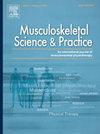马尾筛查中性功能障碍的问题:一项探讨高级实践物理治疗师观点的定性研究
IF 2.2
3区 医学
Q1 REHABILITATION
引用次数: 0
摘要
马尾综合征(CES)是一种罕见但严重的脊柱疾病,可导致膀胱、肠道和性功能障碍的永久性损害。对疑似CES患者的性功能障碍筛查不一致,推断年龄、性别和尴尬可能是漏报的原因,限制了对CES诊断前性功能障碍的患病率和预后重要性的潜在理解。建议进行进一步的培训,以改善CES患者的性功能障碍筛查,但如何进行培训尚未得到充分评估。本定性现象学研究探讨了高级实践物理治疗师(APPs)关于他们目前筛查疑似CES患者性功能障碍的观点。十个应用程序有目的地从北爱尔兰的两个NHS骨科接口服务中取样。通过MS Teams在线进行半结构化访谈,在征得同意的情况下录制视频,然后使用反身性主题分析系统进行编码、转录和分析。我确定了以下主题和副主题:(1)“我在最后把它扔进去”——知道和做之间的紧张关系。(1a)理解经验的影响。(2)临床医生自身特点和信念的影响。“我真的认为这个问题对男人来说比女人更容易回答。”(3)有效的治疗联盟至关重要。(4)进一步培训-互动方式。这些主题提供了对知识翻译,临床医生的信念,临床经验,治疗联盟和反身性之间复杂的相互作用的见解。参与者建议主要利益相关者参与互动培训,并应考虑在未来的研究中实施。本文章由计算机程序翻译,如有差异,请以英文原文为准。
The question of sexual dysfunction during cauda equina screening: A qualitative study exploring the views of advanced practice physiotherapists
Cauda Equina Syndrome (CES) is a rare but serious spinal condition which can result in permanent impairment of bladder, bowel and sexual dysfunction. Screening for sexual dysfunction in suspected CES is inconsistent, with age, gender and embarrassment inferred as likely reasons for under reporting, limiting potential understanding of the prevalence and prognostic importance of sexual dysfunction pre CES diagnosis. Further training has been suggested to improve screening for sexual dysfunction in CES, but how this should be delivered has not been fully evaluated.
This qualitative phenomenological study explores the views of Advanced Practice Physiotherapists (APPs) regarding their current screening practices for sexual dysfunction in suspected CES. Ten APPs were purposively sampled from two NHS Orthopaedic interface services in Northern Ireland. Semi-structured interviews were conducted on-line via MS Teams, video recorded with consent and then coded, transcribed and analysed using a system of reflexive thematic analysis.
The following themes and subthemes were identified (1) ‘I throw it in at the end’ – the tension between knowing and doing. (1a) Understanding the impact of experience. (2) The influence of the clinician's own characteristics and beliefs. (2a) ‘I really think the question is easier for a man to answer than a woman’. (3) An effective therapeutic alliance matters. (4) Further training – an interactive approach. These themes offer insight into the complex interplay between knowledge translation, clinicians' beliefs, clinical experience, the therapeutic alliance and reflexivity. Interactive training involving key stakeholders was recommended by participants and implementation should be considered for future research.
求助全文
通过发布文献求助,成功后即可免费获取论文全文。
去求助
来源期刊

Musculoskeletal Science and Practice
Health Professions-Physical Therapy, Sports Therapy and Rehabilitation
CiteScore
4.10
自引率
8.70%
发文量
152
审稿时长
48 days
期刊介绍:
Musculoskeletal Science & Practice, international journal of musculoskeletal physiotherapy, is a peer-reviewed international journal (previously Manual Therapy), publishing high quality original research, review and Masterclass articles that contribute to improving the clinical understanding of appropriate care processes for musculoskeletal disorders. The journal publishes articles that influence or add to the body of evidence on diagnostic and therapeutic processes, patient centered care, guidelines for musculoskeletal therapeutics and theoretical models that support developments in assessment, diagnosis, clinical reasoning and interventions.
 求助内容:
求助内容: 应助结果提醒方式:
应助结果提醒方式:


